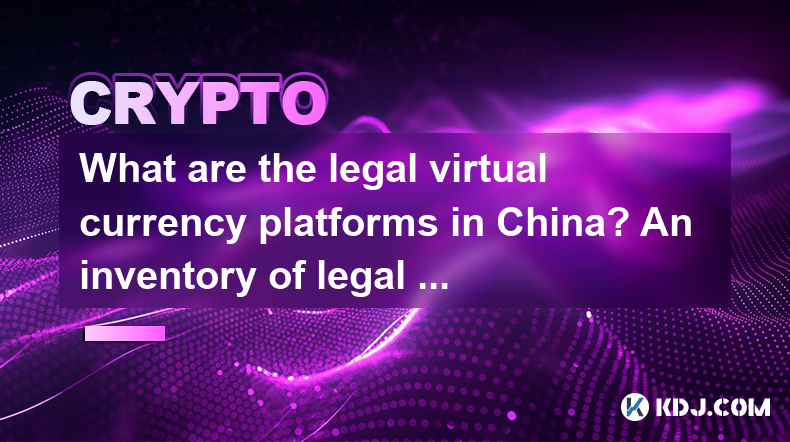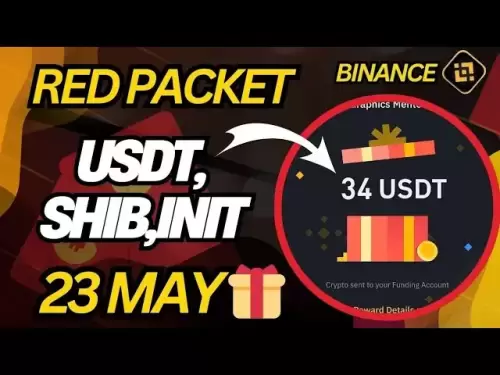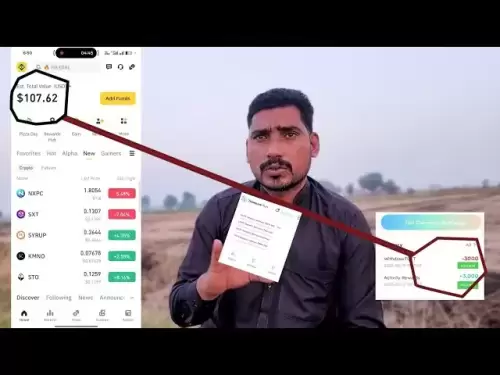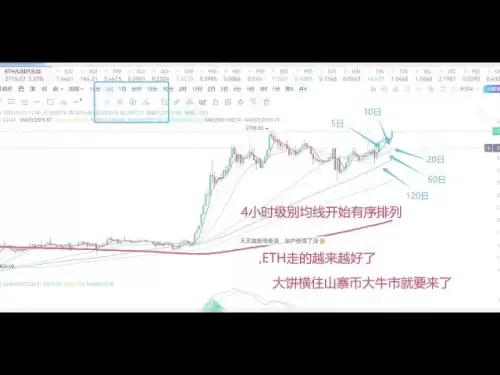-
 Bitcoin
Bitcoin $111,031.7204
0.21% -
 Ethereum
Ethereum $2,669.5193
0.46% -
 Tether USDt
Tether USDt $0.9999
-0.01% -
 XRP
XRP $2.4420
0.83% -
 Solana
Solana $185.9018
4.26% -
 BNB
BNB $683.5331
-0.11% -
 USDC
USDC $0.9998
0.00% -
 Dogecoin
Dogecoin $0.2462
2.44% -
 Cardano
Cardano $0.8161
2.14% -
 TRON
TRON $0.2735
-1.51% -
 Sui
Sui $3.8660
-5.10% -
 Hyperliquid
Hyperliquid $36.8952
18.48% -
 Chainlink
Chainlink $17.0879
3.28% -
 Avalanche
Avalanche $25.6299
2.87% -
 Stellar
Stellar $0.3036
0.98% -
 Shiba Inu
Shiba Inu $0.0...01559
1.89% -
 Bitcoin Cash
Bitcoin Cash $441.4992
1.37% -
 Hedera
Hedera $0.2065
1.63% -
 UNUS SED LEO
UNUS SED LEO $8.7932
-0.74% -
 Toncoin
Toncoin $3.1569
-0.49% -
 Polkadot
Polkadot $4.9645
1.78% -
 Litecoin
Litecoin $101.5846
3.09% -
 Monero
Monero $394.6835
-2.35% -
 Bitget Token
Bitget Token $5.6901
7.06% -
 Pepe
Pepe $0.0...01573
8.66% -
 Pi
Pi $0.7887
-4.68% -
 Dai
Dai $0.9998
0.00% -
 Ethena USDe
Ethena USDe $1.0002
-0.02% -
 Uniswap
Uniswap $6.5534
1.58% -
 Bittensor
Bittensor $467.2833
-0.09%
What are the legal virtual currency platforms in China? An inventory of legal virtual currency platforms
Despite the global trend of legalizing virtual currency platforms, China maintains its strict regulations, prohibiting all such operations within the country.
Feb 05, 2025 at 11:37 pm

Key Points:
- Virtual currency platforms in China are subject to strict regulations.
- As of 2023, there are no legal virtual currency platforms in China.
- The Chinese government has consistently taken a tough stance against cryptocurrency trading and mining.
- Several countries have implemented legal frameworks for virtual currency platforms.
Current Legal Situation in China
China has implemented a comprehensive ban on cryptocurrency trading, mining, and initial coin offerings (ICOs) since 2021. All virtual currency exchanges and over-the-counter (OTC) trading platforms have been prohibited from operating in the country.
As a result, there are currently no legal virtual currency platforms in China. Any individuals or entities caught engaging in cryptocurrency-related activities may face legal penalties.
International Comparison
While China has adopted a strict approach towards cryptocurrencies, several other countries have established legal frameworks for virtual currency platforms. These frameworks vary in their scope and regulations, but they generally aim to ensure consumer protection and prevent money laundering and other illicit activities.
Some of the countries with legal frameworks for virtual currency platforms include:
- United States: The Securities and Exchange Commission (SEC) and the Commodity Futures Trading Commission (CFTC) have jurisdiction over cryptocurrency exchanges and other platforms.
- Japan: The Financial Services Agency (FSA) regulates cryptocurrency exchanges and requires them to register with the government.
- South Korea: The Financial Services Commission (FSC) oversees cryptocurrency exchanges and requires them to comply with anti-money laundering (AML) and know-your-customer (KYC) regulations.
- European Union: The European Union has adopted the Markets in Crypto-Assets (MiCA) Regulation, which provides a harmonized legal framework for virtual currency platforms across the bloc.
Steps to Establish a Legal Virtual Currency Platform in China
Until the Chinese government changes its current stance on cryptocurrencies, it is not possible to establish a legal virtual currency platform in the country. The following steps would be required if the regulations were to be revised:
- Obtain a license from the Chinese government: Virtual currency platforms would need to obtain a license from the appropriate regulatory authority, such as the People's Bank of China (PBOC) or the China Securities Regulatory Commission (CSRC).
- Comply with AML and KYC regulations: Platforms would be required to implement strong AML and KYC measures to prevent money laundering and other illicit activities.
- Separate customer assets from platform funds: Platforms would need to segregate customer assets from their own funds to protect user funds in the event of insolvency.
- Implement robust security measures: Platforms would be required to have robust security measures in place to protect against hacking and other cybersecurity threats.
- Cooperate with law enforcement: Platforms would need to cooperate with law enforcement agencies in investigations and prosecutions related to cryptocurrency-related crimes.
FAQs
Q: Why did China ban cryptocurrency trading?
A: The Chinese government cited concerns about financial stability, consumer protection, and money laundering as reasons for banning cryptocurrency trading.
Q: Are there any legal ways to buy and sell cryptocurrencies in China?
A: As of 2023, there are no legal ways to buy and sell cryptocurrencies in China.
Q: What are the consequences of engaging in cryptocurrency activities in China?
A: Individuals and entities caught engaging in cryptocurrency-related activities in China may face legal penalties, such as fines or imprisonment.
Q: Is it possible to establish a legal virtual currency platform in China?
A: It is not currently possible to establish a legal virtual currency platform in China due to the ban on cryptocurrency trading.
Disclaimer:info@kdj.com
The information provided is not trading advice. kdj.com does not assume any responsibility for any investments made based on the information provided in this article. Cryptocurrencies are highly volatile and it is highly recommended that you invest with caution after thorough research!
If you believe that the content used on this website infringes your copyright, please contact us immediately (info@kdj.com) and we will delete it promptly.
- Bitcoin Pepe (BPEP) price prediction as burn rate hits 410 trillion
- 2025-05-23 19:00:14
- Is Trump Benefitting from a Lack of Trust in Politicians?
- 2025-05-23 19:00:14
- Punisher Coin: The Disruptor Enters the Arena
- 2025-05-23 18:55:14
- The White House's AI and Crypto Czar, David Sacks, has said that the Trump administration is optimistic about the GENIUS Act
- 2025-05-23 18:55:14
- Buyers of US President Donald Trump's meme coin converge at his private country club
- 2025-05-23 18:50:15
- Polygon (MATIC) Tops The Daily NFT Market Chart as Non-fungible Token (NFT) Collections Explode in Trading Sales Volume
- 2025-05-23 18:50:15
Related knowledge

What is Ethereum’s Slashing mechanism and how to punish malicious behavior?
Feb 20,2025 at 03:08am
Key PointsOverview of slashingDifferent types of slashing in EthereumIncentives and consequences of slashingIdentifying and reporting slashed validatorsOngoing discussions and potential improvementsEthereum's Slashing Mechanism: Punishing Malicious BehaviorEthereum's slashing mechanism is an essential tool for ensuring network security and punishing mal...

What is the verifier node of Ethereum and how to become a verifier?
Feb 19,2025 at 06:00pm
The Verifier Node of Ethereum: A Comprehensive GuideKey Points:What is a Verifier Node?How to Become a Verifier NodeResponsibilities and Rewards of a Verifier NodeMinimum Requirements for Becoming a Verifier NodePotential Difficulties in Running a Verifier Node1. What is a Verifier Node?A Verifier Node is an independent entity on the Ethereum network th...

What is Ethereum’s staking, and how to participate and earn money?
Feb 19,2025 at 04:37pm
Key Points:Understanding Ethereum's Staking MechanismSteps to Participate in StakingBenefits and Rewards of StakingSecurity and Risk ConsiderationsTechnical Requirements and Hardware OptionsPotential Challenges and Troubleshooting TipsFAQs on Ethereum StakingWhat is Ethereum's Staking?Proof-of-Stake (PoS) is a consensus mechanism used in blockchain netw...

What is Ethereum’s DAO (Decentralized Autonomous Organization) and how does it work?
Feb 20,2025 at 03:12am
Key PointsDefinition and Structure of a DAOGovernance and Decision-Making in DAOsBenefits and Use Cases of DAOsChallenges and Limitations of DAOsWhat is Ethereum's DAO (Decentralized Autonomous Organization) and How Does It Work?Definition and Structure of a DAOA Decentralized Autonomous Organization (DAO) is an innovative governance and management fram...

What is Ethereum's multi-signature wallet and how to improve security?
Feb 20,2025 at 02:18pm
Key Points:Understanding the Concept of a Multi-Signature WalletBenefits and Drawbacks of Multisig WalletsRequirements for Setting Up a Multisig WalletStep-by-Step Guide to Generating a Multisig WalletImplementing Strategies for Enhanced Security1. Understanding the Concept of a Multi-Signature WalletA multi-signature (multisig) wallet in the Ethereum e...

What is Ethereum's oracle and how to provide data for smart contracts?
Feb 21,2025 at 01:30am
Key Points:Understanding the concept of oracles in EthereumExploring different types of oraclesDetailed guide on how to provide data for smart contractsAddressing potential challenges and considerationsWhat is Ethereum's Oracle?Oracles are crucial components in the Ethereum ecosystem, enabling smart contracts to access real-world data and off-chain even...

What is Ethereum’s Slashing mechanism and how to punish malicious behavior?
Feb 20,2025 at 03:08am
Key PointsOverview of slashingDifferent types of slashing in EthereumIncentives and consequences of slashingIdentifying and reporting slashed validatorsOngoing discussions and potential improvementsEthereum's Slashing Mechanism: Punishing Malicious BehaviorEthereum's slashing mechanism is an essential tool for ensuring network security and punishing mal...

What is the verifier node of Ethereum and how to become a verifier?
Feb 19,2025 at 06:00pm
The Verifier Node of Ethereum: A Comprehensive GuideKey Points:What is a Verifier Node?How to Become a Verifier NodeResponsibilities and Rewards of a Verifier NodeMinimum Requirements for Becoming a Verifier NodePotential Difficulties in Running a Verifier Node1. What is a Verifier Node?A Verifier Node is an independent entity on the Ethereum network th...

What is Ethereum’s staking, and how to participate and earn money?
Feb 19,2025 at 04:37pm
Key Points:Understanding Ethereum's Staking MechanismSteps to Participate in StakingBenefits and Rewards of StakingSecurity and Risk ConsiderationsTechnical Requirements and Hardware OptionsPotential Challenges and Troubleshooting TipsFAQs on Ethereum StakingWhat is Ethereum's Staking?Proof-of-Stake (PoS) is a consensus mechanism used in blockchain netw...

What is Ethereum’s DAO (Decentralized Autonomous Organization) and how does it work?
Feb 20,2025 at 03:12am
Key PointsDefinition and Structure of a DAOGovernance and Decision-Making in DAOsBenefits and Use Cases of DAOsChallenges and Limitations of DAOsWhat is Ethereum's DAO (Decentralized Autonomous Organization) and How Does It Work?Definition and Structure of a DAOA Decentralized Autonomous Organization (DAO) is an innovative governance and management fram...

What is Ethereum's multi-signature wallet and how to improve security?
Feb 20,2025 at 02:18pm
Key Points:Understanding the Concept of a Multi-Signature WalletBenefits and Drawbacks of Multisig WalletsRequirements for Setting Up a Multisig WalletStep-by-Step Guide to Generating a Multisig WalletImplementing Strategies for Enhanced Security1. Understanding the Concept of a Multi-Signature WalletA multi-signature (multisig) wallet in the Ethereum e...

What is Ethereum's oracle and how to provide data for smart contracts?
Feb 21,2025 at 01:30am
Key Points:Understanding the concept of oracles in EthereumExploring different types of oraclesDetailed guide on how to provide data for smart contractsAddressing potential challenges and considerationsWhat is Ethereum's Oracle?Oracles are crucial components in the Ethereum ecosystem, enabling smart contracts to access real-world data and off-chain even...
See all articles
























































































